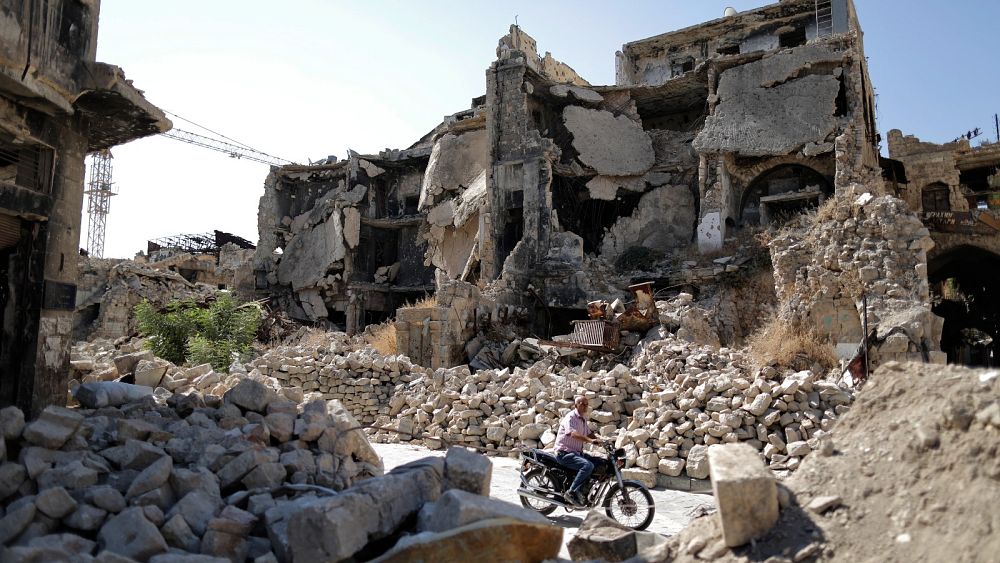When Syrian President Bashar Assad won a fourth term in office on May 26 with 95.1% of the votes, the European Union along with other Western powers swiftly denounced the election as a fraud.
“The elections that took place in Syria on 26 May met none of the criteria of a genuinely democratic vote,” said High Representative Josep Borrell in a statement. “It cannot lead to any measure of international normalisation with the Syrian regime.”
The European Union has adopted sanctions against the Assad regime ever since the decade-old conflict began in 2011. The sanctions have escalated as the war unfolded, killing half a million people and driving 11 million from their homes.
But Brussels’ firm position towards the Assad regime contrasts with the recent moves of individual EU member states to re-open their embassies in Damascus.
Since 2012, only the Czech Republic had kept its embassy open in the war-torn country, while others severed their ties with Damascus and evacuated their diplomatic representations.
Yet as Assad’s government has regained control of the majority of the country with the backing of Moscow and Tehran, some EU countries appear tempted to restore diplomatic relations with Damascus.
Euronews has learned that at least four EU member states currently have a diplomatic mission operating in some capacity in the Middle Eastern country.
Why are European diplomats returning to Damascus and what does that mean for the EU’s policy against normalising relations with the Assad regime?
Here is what we know so far.
What’s the diplomatic presence of EU countries in Syria?
A majority of EU nations have their embassies in Syria still evacuated with diplomats operating from neighbouring Lebanon and visiting Syria from time to time, a diplomatic source told Euronews. Some member states “still keep a strict policy of no embassy, no contact with the regime,” the source said.
But an increasing number of EU countries are boosting their diplomatic presence in Syria in recent months.
Bulgaria – Ambassador
Besides the Czech Republic, Bulgaria has a permanent diplomatic representation in Syria through its embassy in Damascus. The country has appointed an ambassador in Syria, Tigran Gevorgyan, according to the embassy’s official website.
Bulgaria is also listed among the countries with a diplomatic mission in Damascus by the Syrian Ministry of Foreign Affairs website. Euronews called the Bulgarian embassy in Damascus and received confirmation from administrative staff that the embassy was open though it did not operate “as usual.”
Cyprus – Chargé d’affaires
Cyprus’ chargé d’affaires in Damascus, Sevag Avedissian, told Euronews that Nicosia’s embassy in Syria was “in the process of resuming operations” and will reopen “in the coming weeks.” He added that the country had had a permanent diplomatic presence in a hotel, rather than its own premises, “since mid-October” last year.
He insisted that the country didn’t appoint an ambassador to Syria but a chargé d’affaires, “without presenting credentials to Assad in line with EU policy.” The bloc does not recognise Assad as a legitimate head of state and therefore EU countries’ ambassadors would not present their credentials to him.
“We left Damascus for security reasons, not because we wanted to suspend diplomatic relations,” the diplomat explained, adding that Cypriot diplomats continued to cover Syria from Lebanon throughout the war.
“If you look at a map, Syria is the second closest country to Cyprus in geographic terms,” Avedissian said, recalling that Nicosia didn’t maintain relations with neighbouring Turkey, which does not recognise Cyprus. “It’s important to be present in neighbouring countries,” he told Euronews. “We had to be back.”
“We’re not the first and we won’t be the last to return,” he added, with reference to other countries that have already reopened their embassies or are preparing to do so.
Hungary – Chargé d’affaires
A chargé d’affaires and a consul have been appointed at the Hungarian embassy in Damascus since last year, and the embassy is “open but with limited activity,” a source told Euronews. When contacted by our journalists, the Hungarian Ministry of Foreign Affairs said: “Hungary has a diplomatic presence on chargé d’affaires’ level in Syria, which presence is indicated by the humanitarian work and the aid projects of the ’Hungary Helps’ programme.”
Austria – contested
In addition to these four countries, Austria is also listed among the countries with a diplomatic mission in Damascus by the Syrian Ministry of Foreign Affairs’ website. But the Austrian Foreign Ministry told Euronews that all embassy activities were still conducted from Beirut.
“Austria’s Embassy in Damascus has never been closed, but most of the staff was relocated to Beirut for security reasons in 2012. All Embassy activities are conducted from Beirut, including consular, while we maintain the building owned by Austria with the help of locally recruited staff,” the statement sent to Euronews read.
Greece – unsubstantiated
The Greek City Times, citing a Syrian journalist on the ground, said Athens was preparing to reopen its embassy “within weeks,” after noting that the Greek and EU flags were once again raised on its Damascus embassy.
Qatari newspaper Al-Watan reported that several EU countries including Greece were planning to re-engage diplomatically with Syria. Lebanese daily L’Orient Le Jour even cited an anonymous Syrian diplomat, speaking to unofficial Sham radio, and claiming that both Cyprus and Greece reopened their embassies over six months ago.
Our journalists did not hear back from Greek authorities regarding alleged plans to reopen Athens’ embassy in Damascus.
“I cannot comment on the speculations about the alleged opening of Embassies of individual Member States in Syria or anywhere in the world – this is a sovereign right and privilege of each country to decide when and in what form they open a diplomatic representation abroad,” said Peter Stano, Lead Spokesperson at the European Union External Action Service when reached by Euronews.
What has been the EU policy in Syria so far?
EU sanctions that have been in force for a decade include travel bans and asset freezes against Assad and other top political officials, military officers and business people. Currently, 283 people and 70 entities in Syria are on the EU’s sanctions list.
Brussels has been adamant that any form of normalisation with the Assad regime was out of the question. The European Parliament reiterated this position in a recent resolution adopted in March. “As long as there is no fundamental progress on the ground with clear, sustained and credible engagement in an inclusive political process, MEPs oppose any normalisation of diplomatic relations with the Syrian regime,” the text read.
Despite its firm stance against the Syrian regime, the EU still maintains lower-level diplomatic contacts with Syria.
The EU Delegation to Syria continues to operate from Beirut, while carrying out regular missions to Damascus, according to its website. It still has premises in Damascus with local staff only, a diplomatic source told Euronews.
Julien Barnes-Dacey, director of the Middle East & North Africa programme at the European Council on Foreign Relations, told Euronews that maintaining such a diplomatic presence in Syria did not contradict the EU’s policy not to normalise relations with the regime.
“The contacts are fairly low level and distant and we would fall into a trap of our own making if we equated that to diplomatic recognition,” the expert told Euronews.
He noted that these lower-level contacts “served a valuable purpose,” including understanding the situation on the ground and operationalising the bloc’s humanitarian support in Syria. The EU is the largest international donor to the war-torn country, with over €24 billion mobilised to help those affected by the armed conflict.
MEP Barry Andrews, who has worked extensively on EU-Syria relations, agreed on the need for the EU to maintain channels of communications with Damascus.
“I think there has to be a line of communication. I have consistently called for the appointment, by the external action service, of an EU special envoy to the Syrian conflict. We need to have an opportunity for a dialogue of some sort, and channels of communications. And I think a special envoy would underline how seriously we take this issue,” he told Euronews.
Is a policy change in sight for EU-Syria relations?
Reports of European countries preparing to reopen their embassies in Damascus come amid fears of a normalisation of the Assad regime in the international arena.
Last month, a decision to grant the Assad’s government a seat on the executive board of the World Health Organisation sparked criticism and protests in rebel-held areas.
Yet multiple sources told Euronews that the EU was nowhere near normalising its relations with the Assad regime despite the reopening of small diplomatic missions.
“I don’t think the position has changed whatsoever at EU level. I would not entirely dismiss these reports, but I would put them in the context of other issues, not related to Syria directly but more related to anxieties about Turkish foreign policy, in the case of both Greece and Cyprus,” said Andrews.
“So those reports are really more about regional issues and in the case of Hungary, a way to undermine the European ideal in a way that has been a feature of Hungarian policy over the last couple of years,” the Renew Europe MEP told Euronews.
Barnes-Dacey noted that “none of the key EU member states” had moved in the direction of normalising diplomatic relations and that the bloc had just renewed its sanctions on Syria last month. “So I don’t necessarily read this as too profound of a shift,” he said of the reopenings.
“That being said, I think there is some sense in European capitals that the harder armed conflict element of the civil war is ending and there is an interest in some lower-level contact on the ground to advance narrow interests,” he added.
“I’m very disheartened to hear this happening,” said Andrews as reports of European embassies reopening emerged.
“That there would be member states who would consider expanding relations with Syria is completely unexplainable to people I represent. We passed a resolution about impunity and evidence has been gathered with the potential for future prosecutions to hold to account the Syrian regime for war crimes. Are we seriously going to ignore that and come back to normalisation in circumstances where there has been no progress on the Syrian side?” the MEP questioned.
But the bloc doesn’t have much leverage against member states willing to restore diplomatic ties with Syria. “Common foreign security policy is associated with the exercise of the veto, so even any condemnation would be difficult to achieve,” Andrews noted.
Ultimately, the moves may play out in favour of the Syrian regime. Before our journalists were able to confirm some of the reopenings, a diplomatic source told Euronews that rumours regarding Cypriot, Greek and Hungarian embassies had been “recently revived by Assad propaganda to underline its alleged recognition and normalisation.”
“The regime wants to project an image of European re-engagement,” Barnes-Dacey confirmed, “so this could very well be a message driven by Damascus.”
_Euronews’ Orlando Crowcoft and Nadine Abdel-Hamid contributed to this report. _







